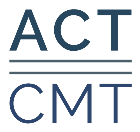
Accelerate Clinical Trials in Charcot-Marie-Tooth Disease (ACT-CMT)
This study is an extension of the international research project called called Accelerate Clinical Trials in Charcot Marie Tooth Disease (ACT-CMT). This extension to this study is funded by the Charcot Marie Tooth Association (CMTA). Dr. David Herrmann at the University of Rochester is the study Principal Investigator. There are 4 participating centers in the USA.
- University of Rochester, NY (Dr. David Herrmann)
- University of Pennsylvania, PA (Dr. Steve Scherer)
- University of Iowa, IA (Dr. Mike Shy)
- Massachusetts General Hospital (Dr. Reza Seyedsadjadi)
This extension study will include people who have already participated in ACT-CMT and new people with CMT1A who are aged 18-65.
The purpose of this study is to determine the best way to measure the progression of Charcot-Marie-Tooth Disease Type 1A (CMT1A) over time. This study is important to help us to prepare for clinical trials. We are looking at new ways of measuring changes in CMT1A progression over a short period of time and assessing their usefulness in measuring effects of treatments in future clinical trials.
In addition to measurements that are currently used to measure progression of CMT1A such as strength and sensation, this study would also include the following:
- Two questionnaires (the CMT Health Index and Overall Neuropathy Limitation Scale) that explore how CMT1A affects you
- Standardized questions and clinical examination of your CMT, known as the CMT Exam Score (CMTES)
- CMT Functional Outcome Measure (CMT-FOM) which assesses balance, walking, standing up from sitting in a chair, and manual dexterity
- Nerve conduction studies on one arm and one leg
- There are also optional procedures such as ultrasound of muscles and nerves, providing blood and skin samples.
- We may also test your ability to feel nylon monofilaments (like fishing line) and photograph a small area of your hand using a microscope that can look into the skin
There are 2 study visits of up to 4 hours, approximately 12 months apart. Participants will receive an honorarium and reimbursement of qualified travel expenses.
For more information about participating, please contact:
- University of Rochester: Steffen Behrens-Spraggins (585) 275-5760
Steffen_Behrens-spraggins@URMC.Rochester.edu - University of Pennsylvania: Dragan Vujovic (215) 898-0180
Pooja.Patel1@Pennmedicine.upenn.edu - University of Iowa: Thomas Woodford (319) 467-5006
thomas-woodford@uiowa.edu - Massachusetts General Hospital: Dr. Reza Seyedsadjadi
RSEYEDSADJADI@mgh.harvard.edu
Updated on: March 31, 2025





